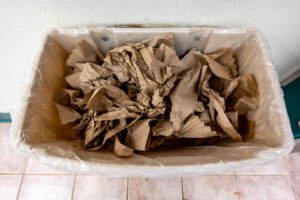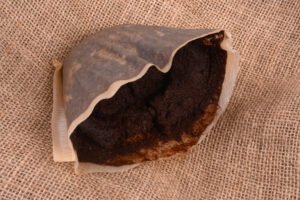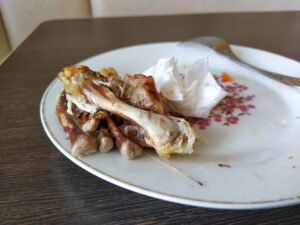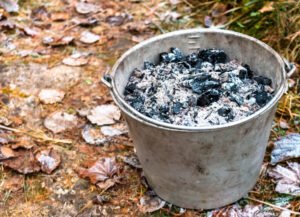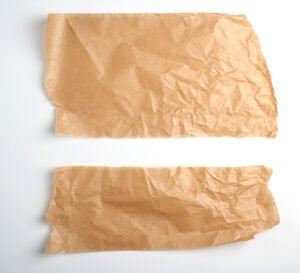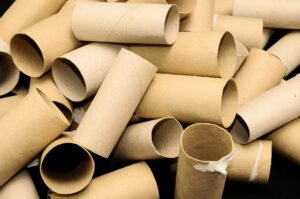Eggs are popular in households, and this protein-rich food is widely consumed. But what about the eggshells? Well, being rich in calcium and other nutrients, eggshells are a great addition to your soil. But can you compost eggshells? Let’s explore.
Key Takeaways
- Yes, you can compost eggshells as they are rich in calcium which helps improve the soil structure and aids plants in building cell walls.
- The most effective way of composting eggshells is hot composting and vermicomposting. You can find the procedure below.
- It’s best to crush the shells into fine pieces before composting them.
- The crushed eggshells are also useful in getting rid of pests. But this is not their only effective use; there’s much more to know!
So, if you want to learn more about composting eggshells, its benefits, and essential tips, continue reading…
How to Compost Eggshells?
Composting eggshells is possible, but these mineral materials take years to degrade if not done the right way. So, follow the steps below to compost eggshells effectively and get the nutrient-rich humus for your plant growth.

Step 1. Wash the Eggshells
Collect eggshells and wash them thoroughly to remove the inner membrane. After washing them, dry the eggshells in the sun or in the oven.
Washing the eggshell kills the salmonella bacteria present in the egg and keeps the animals at bay.
Step 2. Crush the Eggshells
Crush the dried eggshells into small pieces. You can use a mortar and pestle or a coffee grinder to make eggshell powder. The smaller the pieces, the better.
Step 3. Add a layer of Brown Materials
Now, add a layer of brown materials like paper towels, cardboard, dried leaves, dried branches, twigs, and wood chunks by breaking them into small pieces.
Brown materials are rich in carbon and serve as a food source for the microbes in your compost bin.
Step 4. Mix Crushed Eggshells with Other Green Materials
Mix the crushed eggshells with other Nitrogen-rich green composting materials like food scraps, yard waste, grass clippings, and kitchen waste like coffee grounds, peels, rotten veggies, etc.
Make a firm layer of these green materials on the brown ones.
Step 5. Fill the Compost Bin
Continue adding the composting ingredients alternating the layers of brown and green materials. Then seal the compost heap with a firm layer of soil.
Cover your compost with a lid. It helps to conserve heat and accelerate the composting process.
You can use metal sheets, wire-mesh or heavy boards to cover the compost heap.
Step 6. Maintain your Compost Pile
Keep your compost pile damp by watering it regularly. Check the water content and add water accordingly. If your pile has too much water, add more brown materials.
Turn the compost pile with a pitchfork every 3-4 days initially. This will aerate the pile and help accelerate the decomposition.
After 2-6 months of maintaining your compost pile, you can harvest the finished compost and use it to enrich your garden soil.
Can You Compost Eggshells In a Worm Bin?

Eggshells can be used for vermicomposting, as the worms love eggshells. In addition, crushed eggshells act as grit to the worms and help grind their food.
Eggshell neutralizes the pH in the worm bin and helps your worms avoid problems like protein poisoning (a string of pearls). Eggshells also aid in the reproduction of worms. So eggshells are a great addition to your worm bins.
Benefits of Composting Eggshells

Eggshells are a great source of composting material and have numerous benefits for soil. Here are a few other benefits of using compost made of eggshells in the garden.
- It adds calcium and other essential nutrients to the soil and helps in plant growth.
- It prevents the blossom end rot disease in several plants.
- The nutrients in eggshells help adjust acidic soil by increasing the soil pH.
- It is a cheap source of organic fertilizer and is readily available.
- It is eco-friendly and reduces waste in landfills.
- It improves soil structure and the aeration of the soil.
Nutrient Composition of Eggshells
Eggshell comprises 95 % Calcium Carbonate (CaCo3), known as lime. An average eggshell contains approximately 2.2 gm of calcium. Other major nutrients in eggshells are 0.3 % Phosphorus and 0.3% Magnesium.
The shell also contains trace amounts of Zinc (Zn), Iron (Fe), Manganese (Mn), Copper (Cu), Sodium (Na), and Potassium (K).
Together, these nutrients help improve the soil quality and enhance the soil structure, making it more fertile.
Risk of Salmonella in Compost
While composting eggshells, watch out for Salmonella! Salmonella bacteria reside on eggshells and may reach your compost pile if you throw the eggshells without washing them.
It is dangerous, especially when you are using compost for vegetables and fruits, as they can be consumed raw and enter your digestive tract.
To kill the salmonella, you need to generate heat in the compost pile. A high temperature of 140-160 degrees Fahrenheit will be enough to get rid of this bacteria.
You can generate heat by turning the pile regularly and adding 2/3 of high-carbon materials and 1/3 of nitrogen-rich materials.
Additional Tips For Composting Eggshells
Eggshells are among the most nutritional ingredients to nourish and neutralize the soil. But they should be composted correctly. So here are a few tips for composting eggshells.
- Wash the eggshells thoroughly to kill the salmonella bacteria and keep the animals away.
- Break the eggshells into fine pieces, which will help speed up the breakdown process.
- Close your composting bin with a lid to protect it from animals and quicken the decomposition process.
- Maintain good aeration in the compost pile.
- Maintain the optimal temperature in the bin to keep the microbes active.
Other Uses of Eggshells in Garden

1. As a Liquid Fertilizer
Eggshells are rich in calcium and contain other plant nutrients like Phosphorus, Magnesium, Zinc, Manganese, Copper, Sodium, and Potassium. They act as organic fertilizers and help in plant growth.
The nutrients from the eggshells can be supplemented to the plants through a foliar spray. Follow this step-by-step process to make the liquid fertilizer from eggshells.
- Collect a few eggshells and wash them.
- Boil these eggshells and let them sit overnight.
- Strain the liquid, fill it in the spray bottle, and use it as liquid fertilizer for plants.
Each eggshell adds approximately 4 mg of calcium. Add 2 cups of liquid fertilizer to the plants every two weeks. A pepper and tomato plant thrives well with eggshell fertilizer.
2. To Deter Crawling Pests
Crushed eggshells work as diatomaceous earth and can be used to deter garden pests like slugs, snails, cutworms, and crawling pests.
When these pests come in touch with the crushed eggshell, the eggshell pieces cut their body, eventually making them dehydrate and die.
Simply crush the eggshells, sprinkle them over pest-infected areas and watch them work wonders for you.
3. As a Seed Starter Container

Eggshells can be used as seed starters for sowing seeds. Small and low-growing plants like thyme and succulents can be grown in eggshells.
To use the eggshells as seed starters, follow these steps.
- Crack the egg and remove the yolk and white part.
- Sanitize the eggshell by washing them or boiling them in water.
- Now poke a hole with a pin at the bottom of the eggshell for drainage.
- Fill the eggshell with damp soil.
- Sprinkle 2-3 seeds and cover them with the soil.
- Place these eggshells in a holder and place them near sunlight.
- Transplant the seedlings into the soil along with the shell when they reach the 2-3 leaf stage.
4. To Prevent Blossom-end Rot
Calcium deficiency may lead to blossom end rot in several plants like pepper, squash, tomato, melon, and marigold. Using eggshells can prevent the disease to some extent.
Crush the eggshells and bury them in the soil before planting the crop. You can also use powdered eggshells for this. Calcium slowly releases into the soil and aids in the formation of cell walls, thereby preventing blossom end rot.
Should eggshells be washed before composting?
Yes, you should wash eggshells before composting as they are susceptible to Salmonella bacteria. Salmonella generally infects chicken and spreads to eggs. If such eggshells are used for composting, they can be transferred to the soil and might impact plant health.
How long do eggshells take to compost?
Because eggshells are made of mineral material, they take time to decompose. However, if you grind or break the shells into fine pieces, it will take 2-6 months, and if you throw them into your compost bin as a whole, the eggshells might take a year or more to decompose.
What happens when you bury an eggshell in your garden?
When you bury an eggshell directly in the garden without composting, it takes several months to years to decompose and slowly release nutrients into the soil. These eggshells could only be helpful for plants grown in the next season. So, if you plan to bury them in the soil, make sure to use crushed eggshells.
Can you put rotten eggs in Compost?
Rotten eggs should not be used in compost as the foul odor will attract pesky insects and animals. Moreover, the rotting might be due to any disease, and if the infected eggshells are composted, the infection will spread in your compost bin, later affecting your plants.
Can you compost boiled eggshells?
Yes, boiled eggshells can be composted. Eggshells are high in calcium; boiling them releases only 0.2 percent of the calcium in the water. So composting these eggshells is ideal to utilize the remaining calcium and nutrients. Moreover, the water used for boiling can be used as a foliar spray for plants.
Can you compost cooked eggs?
Cooked eggs release an odor that attracts pests. So it is ideal not to add them to your compost bin. However, if added, make sure to put them in small quantities and bury them deep inside the compost pile.
Does the eggshell pieces in compost cause any problem?
Eggshells do not decompose as quickly as other food waste. However, using this compost is not a problem as it will release calcium and other nutrients into the soil when used.
So, now you know that eggshells can be turned into a nutritious fertilizer that adds organic material and improves the soil structure. So next time when you eat eggs, make sure to use their shells for composting.
Just like eggshells, avocado and avocado pits make good composting ingredients. So, if you are curious to know if you can compost avocado pits or not, join us to learn more.
Happy composting!


